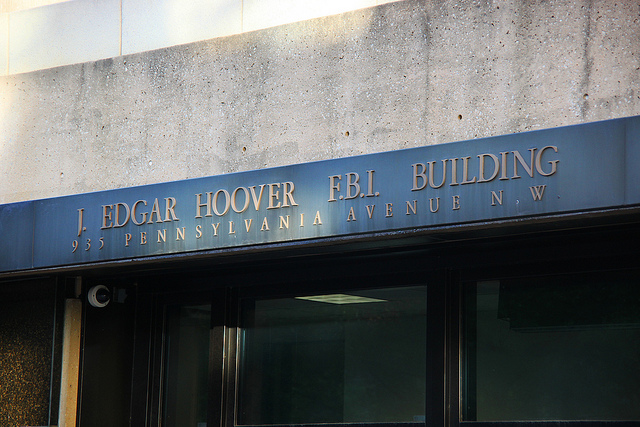Congress Should Reconsider Giving the FBI Director Independence from Presidential Control
Although Christopher Wray seems like a reasonable choice to lead the FBI, appointing a decent new director will do little to cure the terrible damage done by President Trump’s dismissal of James Comey in the middle of his ten-year term because Trump disliked the FBI’s pursuit of the Russia investigations.

Published by The Lawfare Institute
in Cooperation With

Although Christopher Wray seems like a reasonable choice to lead the FBI, appointing a decent new director will do little to cure the terrible damage done by President Trump’s dismissal of James Comey in the middle of his ten-year term because Trump disliked the FBI’s pursuit of the Russia investigations.
Like the controversy over the firing of U.S. Attorneys for apparently political reasons under the George W. Bush administration, Trump’s termination of Comey exposes a significant weakness in how the U.S. legal and political system has attempted to attain independent and apolitical law enforcement. Only norms, politics, and Attorney General guidelines (which the president can choose to ignore) require independence of federal law enforcement from the political or personal whims of the White House, while statutes and constitutional understandings make the FBI director (and U.S. attorneys and attorneys general) an at-will employee of the president.
Since the nadir of the Nixon presidency, we have been lucky to have a string of presidents and attorneys general who largely respected the independence of law enforcement. Presidents continued to set policy and programmatic goals, backed up ultimately by an ability to fire agency heads if they did not implement presidential policy, but the White House has with few exceptions stayed away from attempting to influence particular investigations or cases. An important exception was the U.S. attorney firing scandal, discussed by Jane Chong recently at Lawfare. It hasn't been a perfect system, but it has worked pretty well.
Trump, by contrast, has directly attacked the checks and balances that maintained law enforcement independence.* He seems to care not a whit about these norms and traditions of independence, demanding Comey's loyalty to himself personally and firing Comey when that was not forthcoming. Congressional Republicans have abetted Trump’s breach, imposing no real consequences for his actions. And given Trump’s willingness to dismiss Comey when it seemed that the FBI investigations would put at stake legal jeopardy for Michael Flynn, political distraction for his administration, and possibly a partial undermining of the legitimacy of his electoral victory, it seems unwise to write off the possibility of future destructive action now that Trump’s son and son-in-law seem to have real legal exposure. Robert Mueller cannot possibly feel secure in his position. Deputy Attorney General Rod Rosenstein, who appointed Mueller and by regulation has the authority to fire him, has likely been gaming out what he will do when a Saturday Night Massacre situation arises. Christopher Wray should be asking himself similar questions.
In these circumstances, it seems worthwhile to ask whether the independence of law enforcement, and the FBI specifically, could be bolstered by binding law.
At-Will Employment vs. For-Cause Removal for Agency Heads
There are a variety of ways that Congress can make executive agencies independent of the president. It is generally thought that protection of the agency head's tenure in office with a statutory for-cause removal requirement is the most important. (Although, as Kirti Datla and Richard Revesz have written, not all agencies considered independent have this feature.)
As the Supreme Court has put it, “it is quite evident that one who holds his office only during the pleasure of another cannot be depended upon to maintain an attitude of independence against the latter’s will.” In another case, the Court called the president’s power to remove an agency head for any reason “Damocles’ sword”—a threat that can be expected to exert significant control over the behavior of the person above whom the sword hangs.
By contrast, a statutory provision allowing only for-cause removal means that the president must justify the firing of the agency head by stating a good cause that fits within the statutory categories—reasons such as malfeasance in office, neglect of duty, and the like—and that the firing may be susceptible to judicial review. The heads of independent agencies such as the Federal Trade Commission and Consumer Financial Protection Bureau have this kind of statutory protection for their tenure in office.
The FBI director has a ten-year term as a matter of statute, but Congress has put no restrictions on the president's power to remove the director. It may seem silly to speculate about statutory tenure protection for the FBI director, either because such a restriction on presidential removal power would be so contrary to settled constitutional law, or because it’s nearly impossible to imagine the politics that would lead the current Congress to pass such a statute by a veto-proof margin.
But I’m going to speculate anyway. My justification: previously, at a similar time of crisis about the independence of the FBI from White House interference, some leading members of Congress suggested giving the FBI director for-cause tenure protection. And the constitutional questions may be less well-settled than some suppose.
Congress' Response to Nixon's Subornation of the FBI Director
In the spring of 1973, many in Congress were seething about the FBI and its relationship with the White House and the Watergate cover-up. L. Patrick Gray had been appointed as interim director of the FBI after J. Edgar Hoover died in 1972. Nixon waited for some time to gauge Gray's loyalty, then nominated him to be the permanent director. Immediately after the Watergate burglary, Nixon and White House aides concocted a plan to try to have the CIA warn the FBI off from investigating, on specious national security grounds. When that did not work, the White House settled for having White House Counsel John Dean keep close tabs on the FBI investigation through Gray. Damaging documents from a White House safe were given to Gray by Dean, and Gray destroyed them. These facts emerged in spring 1973 during Gray's confirmation hearings, after which Gray withdrew from consideration for the permanent job and resigned.
Following Gray’s resignation, Congress turned immediately to considering how the FBI could be made apolitical, honest, and substantially independent of White House control.
Robert Byrd, the Democrat's majority whip, thought the problem stemmed from the fact that the FBI was housed within the Department of Justice and reported to the attorney general (even though the director was appointed by the president). Byrd stated that recent attorneys general had been "politically oriented" and "politically motivated," and hence could not be trusted to protect the independence of the FBI. He introduced a bill in April 1973 to remove the FBI from the Department of Justice and make it "an independent establishment of the executive branch."
A prominent Democratic senator, the Cold War hawk Henry "Scoop" Jackson, introduced in April 1973 a bill that would have also removed the FBI from the Department of Justice. But he went much further than Byrd. Jackson's bill would have established the FBI as a truly independent agency through for-cause protection for the director. Specifically, the bill provided that the president may fire the director:
[F]or only the following reasons:
- permanent incapacity,
- neglect of duty,
- malfeasance in office,
- any felony or conduct involving moral turpitude.
A Pennsylvania Republican, Senator Richard Schweiker, in May 1973 introduced the "Independent Federal Bureau of Investigation Act" that paralleled Jackson's approach to the director's tenure in office. Schweiker added a proviso that:
Failure to follow a directive from any member of the executive branch or legislative branch shall not constitute grounds for removal from office unless such failure constitutes dereliction of the lawful duties of the Director. . . .
The Schweiker bill and other bills also sought to extend congressional influence into the bureau by having a number of the top leadership positions in addition to the director require Senate confirmation.
But these bills with tenure protection for the director did not pass. Recently, Susan Hennessey, Matthew Kahn, and I wrote for Lawfare about how Congress ultimately settled in 1976 on the plan of a ten-year, non-renewable term for the director. A fixed and lengthy term in office was thought to give the director a good measure of independence from the president. Congress also posited that the Senate's ability to refuse to concur in the appointment of a new director of the president's choosing, if the president had fired the previous director for inappropriate reasons, would be an additional check against abuse.
The Senate Judiciary Committee's report stated that while the president would retain the power to fire the FBI director, Congress would tolerate the firing only if the director had shown for a "substantial period of time significant disagreement and inability to cooperate with law enforcement policies" of the president. It would be per se improper to fire the director "merely for the reason that a new President desires his 'own man' in the position" or for partisan or political reasons.
The report also stated, in reference to the Jackson and Schweiker bills, that the Committee believed that restrictions on the president's removal power would likely be unconstitutional under two Supreme Court decisions, Myers v. United States and Humphrey's Executor v. United States, holding that agencies performing “purely executive” functions must have heads who can be removed at-will by the president.
Will Congress Respond Appropriately to Trump?
President Trump has now broken the uneasy compromise that has existed since 1976. Independent and apolitical law enforcement is an invaluable aspect of liberty under law, and we will sorely miss it if it’s gone. But as Benjamin Wittes noted, the Senate Judiciary Committee did not approach the Wray confirmation hearing "with the gravity it deserved," given the extraordinary circumstances that led to the vacancy at the top of the FBI. The Senate appears willing to tolerate precisely the kind of abusive presidential interference with FBI independence that it promised not to tolerate in the aftermath of Watergate.
With full appreciation of the near-term political futility of this suggestion, I will still suggest that it makes sense for Congress to consider giving the FBI director for-cause protection from presidential removal, even though that would pose grave separation-of-powers questions under the Constitution.
I’m going to reserve discussion of that constitutional question for another day. Suffice it to say for now that I think there is a colorable, and perhaps even plausible, argument that such a statute would not unconstitutionally interfere with the President’s Article II law execution powers. And the present circumstances seem to call for a muscular response by Congress. Perhaps Senators Jackson and Schweiker were on to something.
*This sentence has been edited for clarity.




_c.jpg?sfvrsn=9bbcc085_3)
